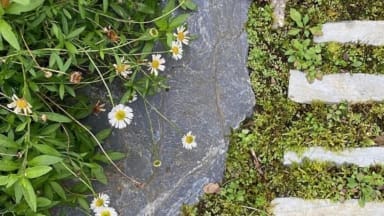
Ethnobotanist and designer, Sid Hill runs an ecological design & landscape studio based in St Ives Cornwall specialising in rewilding landscapes, creating edible ecosystems and restoring environments.
As part of his ecological designs, Hill creatively uses all surfaces – even the humble garden path, to create vibrant micro-habitats. Hill’s garden paths are not only a thing of beauty and practical, but by providing the right conditions, mosses, lichens and plants to establish and thrive. Mosses are true allies in climate change as they have the capacity to capture vast amounts of carbon and they also lay the foundations for plants to flourish – as is evident in Hill’s lively garden paths.
According to Hill, the micro-habitat garden paths provide protection and shelter from trampling, aid in terms water retention, reduce water puddling, limits evaporation and retain nutrients as debris are held and decay in-situ.
Microbiome enhancing hard landscaping
Supporting life on hard surfaces, especially in urban places provides a myriad of benefits; cooling, biodiversity, flood mitigation and according to Hill, has a positive effect on our microbiome.
The human microbiome is referred to as the genomic content of organisms (microbiota) inhabiting the human body. Micro-organisms colonise the various anatomical body sites such as for example our skin.
“The environments we spend our time in affect the diversity and health of our microbiome. Surfaces are teeming with microbes. Without plants and biodiversity the surfaces we touch can host pathogenic microbes. With biodiversity they are far more diverse, reducing pathogenic microbe numbers and can contribute beneficial microbes to the human microbiome. Therefore, environment acts as a probiotic to humans”, explains Hill.
“The sterile playgrounds, plastic lawns and lifeless hard surfaces could be harbouring pathogenic microbes and negatively impacting the health of your family. Whereas, those pesky “weeds” could be offering a probiotic service for your you and your loved ones. We are a walking ecosystem of microbes, we need a diversity of life around us for our own physical and mental health”, he added.
According to Hill, landscape designers have a role to play in creating these probiotic environments which can have a big impact on national health.
Hill trained at the Eden Project and has been running his ecological landscape business for over 13 years. He has a degree in Ethnobotany & Landscape Design and has worked on a wide range of projects. His work has been featured on BBC Gardeners World, Permaculture Magazine and Bloom Magazine. He teaches permaculture design and held the position of lecturer and assessor at Duchy College. Hill was awarded the Prince Of Wales Trophy in Sustainable Horticulture and the ’30 Under 30′ award by Pro Landscaper.

